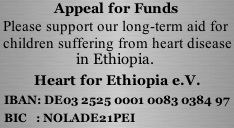Project 2007
March 30, 2007 - April 13, 2007
After the successfull conclusion of the Project 2004 we turned our attention to the long-term care of the patients who had been treated in 2004. We supplied the necessary medication that had to be sent to Addis Ababa in regular intervals. The follow-up examinations on the patients, including heart sonography, was performed in Addis Ababa by Dr. Gedlu. We were pleased to hear about the positive development of “our children”.
Some difficulties arose in the distribution of the medication that was needed to inhibit the blood coagulation of the patients with mechanical heart valves. Some of the children lived very far away from Addis Ababa, in remote areas of the country. The association “We are One” was founded by the patients and their parents, and this organization then helped to assure that a reliable supply of medication found its way to the patients and that the follow-up examinations occurred in a timely manner.
In the meantime, “our children” have continued to develop; some have finished their schooling and have begun a work training program. Some team members have taken on sponsorships for children and continue to support the patients in various ways.
The team met regularly after the Project 2004 to discuss future plans. We planned to travel to Addis Ababa every two years to operate on additonal patients. The original plan, to return to the Black Lion Hospital in 2006, had to be delayed for one year due to political insurgency and a recommendation from the German Ministry for Foreign Affairs.
Even with the experience of the preparations for the Project 2004 under our belt, we still lived through a very intensive, complicated, and exciting time before all the materials were obtained, stored, and shipped. Based on our experience during the Project 2004, we strengthened our team in several positions. Especially in the intensive care department, we found that the provision of medical care round the clock through our own team members resulted in an improved treatment for the post-operative patients.
We arrived in Addis Ababa at the end of March 2007 and were greeted at the airport by the children we had operated on three years earlier. This was a very heartfelt encounter, and we were all very surprised to see to what extent “our children” had developed and matured.
This year we found accommodation at the Ghion Hotel, which was considerably closer to the Black Lion Hospital. In this way the communication between the team members in the hospital and those in the hotel could be better coordinated, and our transport distances were markedly shorter.
The organizational events such as patient selection, cooperation with the colleagues at the Black Lion Hospital in Addis Ababa, and the realization of the operations followed much the same pattern as in the Project 2004.
We performed operations on nineteen patients, nine males and ten females. The mean patient age was 18 years. We replaced eight mitral valves (heart valve between the left atrium and the left ventricle), nine patients received a double valve replacement (seven mitral valve/tricuspid valve and two mitral valve/aortic valve), and one patient received an aortic valve replacement (heart valve between the left ventricle and the aorta). In one patient three heart valves were corrected: the mitral valve and the aortic valve were replaced with mechanical heart valves, and the tricuspid valve was reconstructed.
The operations and the post-operative intensive care were performed with no appreciable complications.
We performed operations on nineteen patients, nine males and ten females. The mean patient age was 18 years. We replaced eight mitral valves (heart valve between the left atrium and the left ventricle), nine patients received a double valve replacement (seven mitral valve/tricuspid valve and two mitral valve/aortic valve), and one patient received an aortic valve replacement (heart valve between the left ventricle and the aorta). In one patient three heart valves were corrected: the mitral valve and the aortic valve were replaced with mechanical heart valves, and the tricuspid valve was reconstructed.
The operations and the post-operative intensive care were performed with no appreciable complications.
At the time of our departure all patients had been transferred out of the intensive care unit onto normal hospital wards. A few members of our intensive care team stayed on for several more days in order to ensure the optimal care of the last patients in the post-operative period.
Of special interest for the whole team was the excursion we undertook with the children who had been treated in 2004. We were able to experience first hand how healthy the children were, and we gained insight into the lives and further development of these patients – this must be continued!


